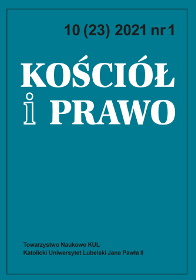Funkcjonowanie kanonicznego porządku prawnego. Prawo Boże, prawo ludzkie, prawo czysto kościelne w prawie kanonicznym
Abstrakt
W zaprezentowanym opracowaniu Autor podjął namysł nad funkcjonowaniem kanonicznego porządku prawnego. Wykazał on, iż prawa kościelnego nie można postrzegać pozytywistycznie. Fundamentu tego systemu nie tworzy bowiem prawo ludzkie, ale prawo Boże. To ono w systemie pełni z jednej strony funkcję konstytucyjną, z drugiej zaś określa granice interpretacji oraz aplikacji prawa kanonicznego. U podstaw prawa kościelnego leżą pryncypia teologiczne.
Ontologicznie prawo Boże jest niezmienne, ponieważ jednym z atrybutów Boga jest niezmienność. Historycznie natomiast jest ono prawem adresowanym do ludzkości. Dlatego też niezmienność dotyczy substratu materialnego prawa, nie odnosi się do sformułowania prawa. Prawo Boże jest zatem deklarowane przez ustawodawcę kościelnego w konkretnym kontekście historycznym. Ze względu na swą zdolność percepcyjną człowiek jest zdolny je opisać i rozpowszechnić. W tworzeniu kościelnego systemu prawnego nie można więc abstrahować od czynnika ludzkiego.
Zdaniem Autora, wskazywanie w doktrynie na poszczególne warstwy systemu prawnego, jakimi są prawo Boże, prawo ludzkie, prawo czysto kościelne ma charakter teoretycznoprawny. Występowanie kategorii prawa czysto kościelnego służy przede wszystkim odróżnieniu tego prawa od prawa Bożego i prawa ludzkiego. Prawo Boże jest zwornikiem i wyznacznikiem wszelkich norm. Władza kościelna zatem nie może stanowić prawa, które byłoby sprzeczne z prawem Bożym.
Bibliografia
Aymans, Winfried. 1985. „Lex canonica. Consideraciones sobre el concepto de ley canónica.” Ius Canonicum 25, nr 2:463-78.
Baura, Eduardo. 2012. Parte generale del diritto canonico. Diritto e sistema normativo. Roma: EDUSC.
Berlingò, Salvatore. 1998. „La prospettiva canonistica: profili ontologico-normativi del diritto di una Chiesa.” W Ius divinum. Fondamentalismo religioso ed esperienza giuridica, red. Francesco D’Agostino, 51-76. Torino: Giappichelli Editore.
Bucci, Onorato. 2011. Gesù il Legislatore. Un contributo alla formazione del patrimonio storico-giuridico della Chiesa nel I millenio cristiano. Città del Vaticano: Libreria Editrice Vaticana.
Crespi Reghizzi, Gabriele, red. 2016. Sistemi giuridici nel mondo. Wyd. 2. Torino: Giappichelli Editore.
De Paolis, Valesio, i Andrea D’Auria. 2008. Le norme generali di Diritto Canonico. Commento al Codice di Diritto Canonico. Roma: Urbaniana University Press.
De Paolis, Valesio. 2010. „Le fonti che la Chiesa riconosce come normative per sé.” W Javier Otaduy, Lezioni di diritto canonico. Tłum. Giuseppe Comotti, 24-25. Venezia: Marcianum Press.
Derdziuk, Andrzej. 2006. „Sumienie ponad prawem?” W Forum internum i forum internum w prawie kanonicznym, red. Ambroży Skorupa, 61-78. Lublin: Wydawnictwo KUL.
Dzierżon, Ginter. 2018. „Zakresy sprawowania władzy rządzenia w kanonicznym porządku prawnym (kan. 130 Kodeksu Prawa Kanonicznego z 1983 roku).” Roczniki Nauk Prawnych 28, nr 3:181-91.
Filipponio, Angiola. 1998. „Normazione divina e normazione umana.” W Diritto divino e legislazione umana, red. Angiola Filipponio, i Raffaele Coppola, 3-18. Torino: Giappichelli Editore.
García Gárate, Alfredo. 2010. „«Ius divinum» y Derecho Canónico.” W Ius divinum, red. Juan I. Arrieta, i Costantino M. Fabris, 195-203. Venezia: Marcianium Press.
Gerosa, Libero. 1998. Prawo Kościoła. Tłum. Ireneusz Pękalski. Poznań: Pallottinum.
González, Ana M. 2006. Claves de ley natural. Madrid: Ediciones Rialp, S.A.
Heinzmann, Marcelo C. 2002. Le leggi irritanti e inhabilitanti. Roma: Gregorian University Press.
Heinzmann, Marcelo C. 2012. „Ley meramente ecclesiástica.” W Diccionario general de Derecho Canónico, red. Javier Otaduy, Antonio Viana, i Joaquín Sedano, t. 5, 96-98. Pamplona: Thomson Reuters Arazandi.
Huxley, Andrew. 2001. „Si può parlare di sistemi giuridici religiosi?” Daimon 1:185-98.
Kistner, Peter. 2009. Das göttliches Recht und die Kirchenverfassung. Berlin: LIT Verlag.
Lo Castro, Gaetano. 1998. „Dimensione «umana» nel diritto divino.” W Diritto divino e legislazione umana, red. Angiola Filipponio, i Raffaele Coppola, 33-77. Torino: Giappichelli Editore.
Lombardía, Pedro. 2004. Lecciones de derecho canónico. Wyd. 2. Madrid: Tecnos.
Martín de Agar, José T. 2002. Introducción al derecho canónico. Wyd. 2. Madrid: Tecnos.
Miñambres, Jesús. 2010. „Il diritto divino come limite al rinvio normativo nell’ordinamento canonico.” W Ius divinum, red. Juan I. Arrieta, i Costantino M. Fabris, 501-12. Venezia: Marcianum Press.
Molano, Eduardo. 2010. „Derecho divino y derecho constitutional canónico.” W Ius divinum, red. Juan I. Arrieta, i Costantino M. Fabris, 223-37. Venezia: Marcianum Press.
Mörsdorf, Klaus. 2008. Fondamenti del diritto. Tłum. Stefano Testa Bappenheim. Venezia: Marcianum Press.
Salvatori, Davide. 2001. L’oggetto del magistero definitivo della Chiesa alla luce del m.p. Ad Tuendam Fidem: il can. 750 visto attraverso i Concili Vaticani. Roma: Gregorian University Press.
Sobański, Remigiusz. 1992. Teoria prawa kościelnego. Warszawa: Wydawnictwo UKSW.
Sobański, Remigiusz. 2001. Nauki podstawowe prawa kanonicznego. Teologia prawa kościelnego. Warszawa: Wydawnictwo UKSW.
Copyright (c) 2021 Kościół i Prawo

Utwór dostępny jest na licencji Creative Commons Uznanie autorstwa – Użycie niekomercyjne – Bez utworów zależnych 4.0 Międzynarodowe.





